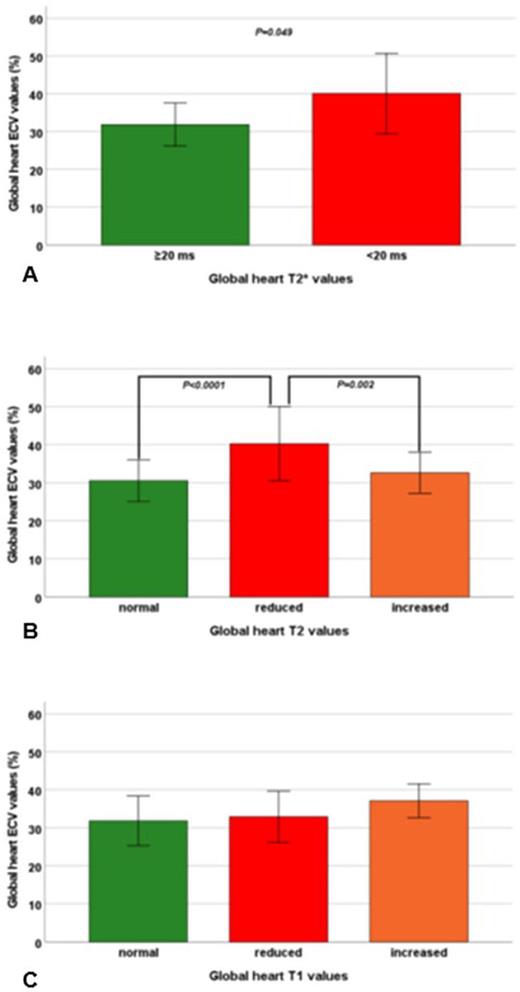Abstract
Cardiovascular magnetic resonance (CMR) is the gold standard for the non-invasive assessment of myocardial tissue properties. All CMR relaxation times (T1, T2 and T2*) are reduced in presence of iron deposits. In the clinical setting the T2* technique is the method of choice for cardiac iron quantification and it has revolutionized the management of patients with thalassemia major (TM). Myocardial extracellular volume( ECV) by CMR has been introduced as a good surrogate imaging marker of diffuse myocardial fibrosis.
This the first study to evaluate the association between ECV values and all three relaxation times in TM.
108 β-TM patients (62 females, 40.16±8.83 years), consecutively enrolled in the Extension-Myocardial Iron Overload in Thalassemia Network, underwent CMR. T2*, T2, and native and post-contrast T1 values were assessed in all 16 myocardial segments. Segmental ECV values were calculated with input of native and post-contrast myocardial segmental and blood pool T1 values and same-day hematocrit. Global value was the mean of all segmental values.
Significant MIO (global heart T2*<20ms) was found in 9 (8.3%) patients. Global ECV values were significantly higher in patients with significant MIO than in patients without significant MIO (40.07±10.62% vs. 31.85±5.71%; p=0.049) (Figure 1A).
T2 images were acquired in 90 patients, of whom 40 (44.4%) had a normal global heart T2 value, 9 (8.3%) a reduced global heart T2 value, and 41 (45.6%) an increased global heart T2 value. Patients with reduced global heart T2 value showed significantly higher global ECV values than patients with normal (40.25±9.74% vs 30.54±5.49%; p<0.0001) as well as increased (40.25±9.74% vs 32.63±5.37%; p=0.002) global heart T2 value (Figure 1B).
Global heart T1 values were normal in 54 (50%) patients, reduced in 50 (46.3%) patients and increased in 4 (3.7%) patients. Global ECV values tended to be higher among patients with increased T1 value (37.13±4.46%) versus both patients with normal or reduced T1 value (31.84±6.52% and 32.93±6.7%, respectively), but the difference among the three groups was not significant (p=0.259) (Figure 1C).
The finding about the increased myocardial ECV in TM patients with reduced global heart T2* value seems to suggest that in TM MIO plays a crucial pathophysiological role in the development of diffuse myocardial fibrosis. This hypothesis is supported by the fact that patients with reduced global heart T2 value showed significantly higher global ECV values than patients with normal or increased global heart T2 value. As TM patients can develop chronic inflammation, the increased myocardial T2 value can be due to myocardial inflammation, that counterbalances the iron effects in non-heavily iron-overloaded hearts. Although myocardial inflammation can affect ECV, confounding the correlation between ECV and fibrosis, the absence of a difference in ECV values between patients with normal and increased global heart T2 value seems to suggest the dominance of fibrosis over inflammation. The absence of a link between decreased T1 and increased ECV may be explained by the fact that although in borderline patients T1 mapping has an higher sensitivity for MIO detection in comparison to the T2* technique, T1 values are not specific for iron and show prolongation in presence of diffuse myocardial fibrosis.
Longitudinal prospective studies are needed to clarify the temporal association between myocardial iron overload and diffuse fibrosis and to obtain a better understanding of the implications of the presence of diffuse myocardial fibrosis.
Disclosures
Maggio:Vertex: Membership on an entity's Board of Directors or advisory committees; Bluebird Bio: Membership on an entity's Board of Directors or advisory committees; Celgene Corp (Bristol Meyers Squibb): Membership on an entity's Board of Directors or advisory committees; Novartis: Membership on an entity's Board of Directors or advisory committees. Pepe:Chiesi Farmaceutici S.p.A: Other: no profit support; Bayer: Other: no profit support. Cademartiri:Chiesi Farmaceutici S.p.A: Other: no profit support; Bayer: Other: no profit support.
Author notes
Asterisk with author names denotes non-ASH members.


This feature is available to Subscribers Only
Sign In or Create an Account Close Modal